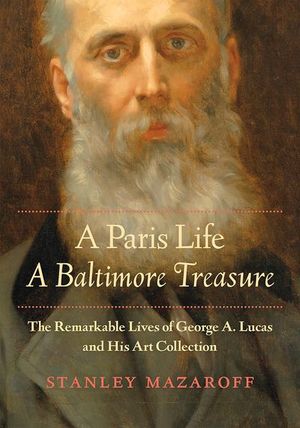A Paris Life, A Baltimore Treasure
Published by Johns Hopkins University Press
“[An] elegantly written account of all facets of the life and career of George A. Lucas . . . of Belle Époque Paris and Gilded Age America.” —Inge Reist, Director Emeritus of The Frick Collection’s Center for the History of Collecting
In 1857, young Baltimorean George A. Lucas arrived in Paris, where he established an extensive personal network of celebrated artists and art dealers, becoming the quintessential French connection for American collectors. The most remarkable thing about Lucas was not the art that he acquired for his clients but the massive collection of 18,000 paintings, drawings, sculptures, and etchings, as well as 1,500 books, journals, and other sources about French artists, that he acquired for himself. Paintings by Cabanel, Corot, and Daubigny, prints by Whistler, Manet, and Cassatt, and portfolios of information about hundreds of French artists filled his apartment and spilled into the adjacent flat of his mistress.
Based primarily on Lucas’s notes and diaries, as well as thousands of other archival documents, A Paris Life, A Baltimore Treasure is a richly illustrated portrayal of Lucas’s fascinating life as an agent, connoisseur, and collector of French mid-nineteenth-century art. And, as revealed in the book, following Lucas’s death, his enormous collection continued to have a vibrant life of its own, when—in 1990—Baltimore’s Maryland Institute proposed to auction or otherwise sell the collection. It rose from obscurity, reached new glory as an irreplaceable cultural treasure, and became the subject of an epic battle fought in and out of court that captivated public attention and enflamed the passions of art lovers and museum officials across the nation.
“Mazaroff has thoughtfully recreated the legacy of one of America’s best documented late-nineteenth-century French art collections.” —Doreen Bolger, Director Emeritus, The Baltimore Museum of Art
In 1857, young Baltimorean George A. Lucas arrived in Paris, where he established an extensive personal network of celebrated artists and art dealers, becoming the quintessential French connection for American collectors. The most remarkable thing about Lucas was not the art that he acquired for his clients but the massive collection of 18,000 paintings, drawings, sculptures, and etchings, as well as 1,500 books, journals, and other sources about French artists, that he acquired for himself. Paintings by Cabanel, Corot, and Daubigny, prints by Whistler, Manet, and Cassatt, and portfolios of information about hundreds of French artists filled his apartment and spilled into the adjacent flat of his mistress.
Based primarily on Lucas’s notes and diaries, as well as thousands of other archival documents, A Paris Life, A Baltimore Treasure is a richly illustrated portrayal of Lucas’s fascinating life as an agent, connoisseur, and collector of French mid-nineteenth-century art. And, as revealed in the book, following Lucas’s death, his enormous collection continued to have a vibrant life of its own, when—in 1990—Baltimore’s Maryland Institute proposed to auction or otherwise sell the collection. It rose from obscurity, reached new glory as an irreplaceable cultural treasure, and became the subject of an epic battle fought in and out of court that captivated public attention and enflamed the passions of art lovers and museum officials across the nation.
“Mazaroff has thoughtfully recreated the legacy of one of America’s best documented late-nineteenth-century French art collections.” —Doreen Bolger, Director Emeritus, The Baltimore Museum of Art
BUY NOW FROM
COMMUNITY REVIEWS

